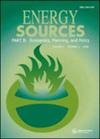Russian gas in Europe: pipeline and hubs price convergence analysis
IF 2.2
4区 工程技术
Q3 ENERGY & FUELS
Energy Sources Part B-Economics Planning and Policy
Pub Date : 2022-12-07
DOI:10.1080/15567249.2022.2147603
引用次数: 0
Abstract
ABSTRACT The analysis in this paper was performed before the disastrous and unsolicited invasion of Russia to Ukraine. The paper aims to identify if the biggest Russian gas exporter Gazprom used market power to decouple its gas prices from European gas hub benchmarks. The empirical analysis is based on pairwise price convergence between the Russian pipeline and European gas hubs. The main finding shows that Gazprom takes advantage of its market position. The proposed model does not support the company’s claims of pipeline price tightness to liquid European gas hubs, and rather proves fluctuating and unstable price convergence between pipelines and hubs from 2016 to March 2020, right before the COVID-19 pandemic. Notably, a robust and trendy-stable price convergence is observed between the Russian pipeline gas and Brent benchmark. Methodologically, the paper contributes with a modified convergence model compliant with gas market fundamentals and suggests a time-expanding concept missed in previous studies. Ongoing political and European gas market developments of 2022 (during the paper review) support the conclusions.俄罗斯天然气在欧洲:管道和枢纽价格趋同分析
本文的分析是在俄罗斯主动入侵乌克兰之前进行的。本文旨在确定俄罗斯最大的天然气出口商俄罗斯天然气工业股份公司(Gazprom)是否利用市场力量将其天然气价格与欧洲天然气中心基准价格脱钩。实证分析基于俄罗斯管道和欧洲天然气枢纽之间的成对价格趋同。主要发现表明,俄罗斯天然气工业股份公司利用了自己的市场地位。该模型并不支持该公司声称的欧洲液态天然气枢纽的管道价格紧缩,而是证明了2016年至2020年3月(COVID-19大流行之前)管道和枢纽之间波动和不稳定的价格趋同。值得注意的是,在俄罗斯管道天然气和布伦特基准天然气之间观察到强劲且趋势稳定的价格趋同。在方法上,本文提出了一个符合天然气市场基本面的修正收敛模型,并提出了以前研究中遗漏的时间扩展概念。2022年(在论文审查期间)持续的政治和欧洲天然气市场发展支持了这一结论。
本文章由计算机程序翻译,如有差异,请以英文原文为准。
求助全文
约1分钟内获得全文
求助全文
来源期刊

Energy Sources Part B-Economics Planning and Policy
ENERGY & FUELS-
CiteScore
6.80
自引率
12.80%
发文量
42
审稿时长
6-12 weeks
期刊介绍:
12 issues per year
Abstracted and/or indexed in: Applied Science & Technology Index; API Abstracts/Literature; Automatic Subject Index Citation; BIOSIS Previews; Cabell’s Directory of Publishing Opportunities in Economics and Finance; Chemical Abstracts; CSA Aquatic Science & Fisheries Abstracts; CSA Environmental Sciences & Pollution Management Database; CSA Pollution Abstracts; Current Contents/Engineering, Technology & Applied Sciences; Directory of Industry Data Sources; Economic Abstracts; Electrical and Electronics Abstracts; Energy Information Abstracts; Energy Research Abstracts; Engineering Index Monthly; Environmental Abstracts; Environmental Periodicals Bibliography (EPB); International Abstracts in Operations Research; Operations/Research/Management Science Abstracts; Petroleum Abstracts; Physikalische Berichte; and Science Citation Index.
Taylor & Francis make every effort to ensure the accuracy of all the information (the "Content") contained in our publications. However, Taylor & Francis, our agents, and our licensors make no representations or warranties whatsoever as to the accuracy, completeness, or suitability for any purpose of the Content. Any opinions and views expressed in this publication are the opinions and views of the authors, and are not the views of or endorsed by Taylor & Francis. The accuracy of the Content should not be relied upon and should be independently verified with primary sources of information. Taylor & Francis shall not be liable for any losses, actions, claims, proceedings, demands, costs, expenses, damages, and other liabilities whatsoever or howsoever caused arising directly or indirectly in connection with, in relation to, or arising out of the use of the Content. Terms & Conditions of access and use can be found at http://www.tandfonline.com/page/terms-and-conditions .
 求助内容:
求助内容: 应助结果提醒方式:
应助结果提醒方式:


